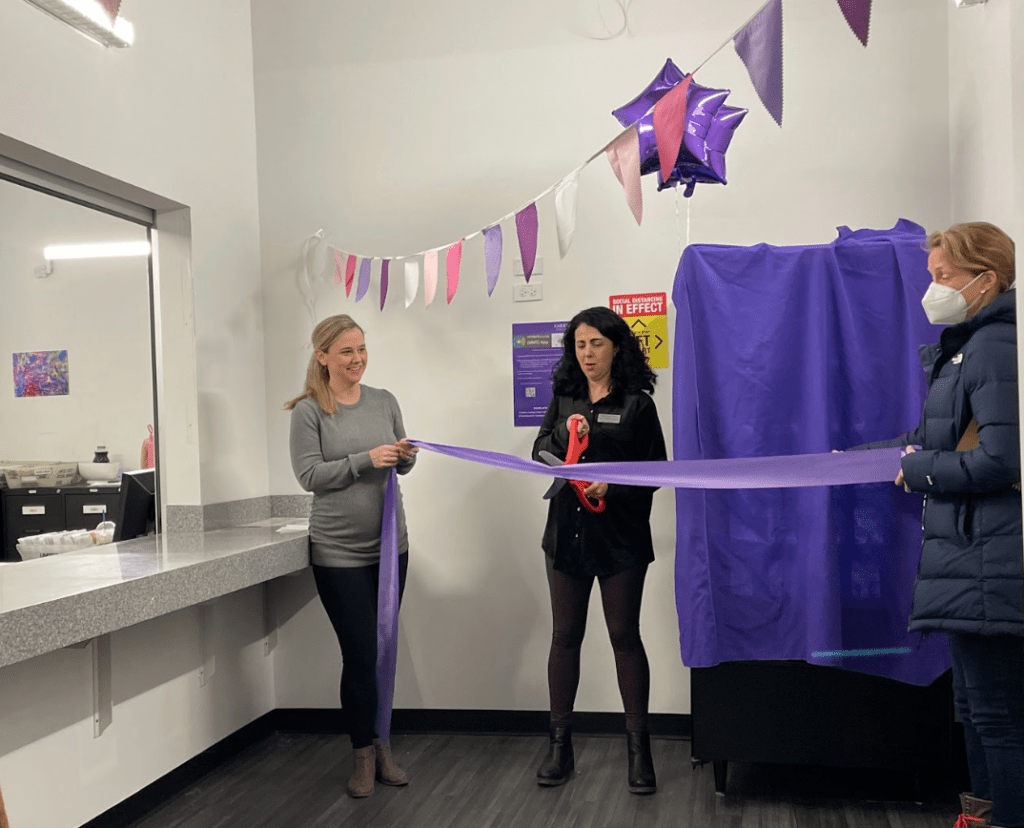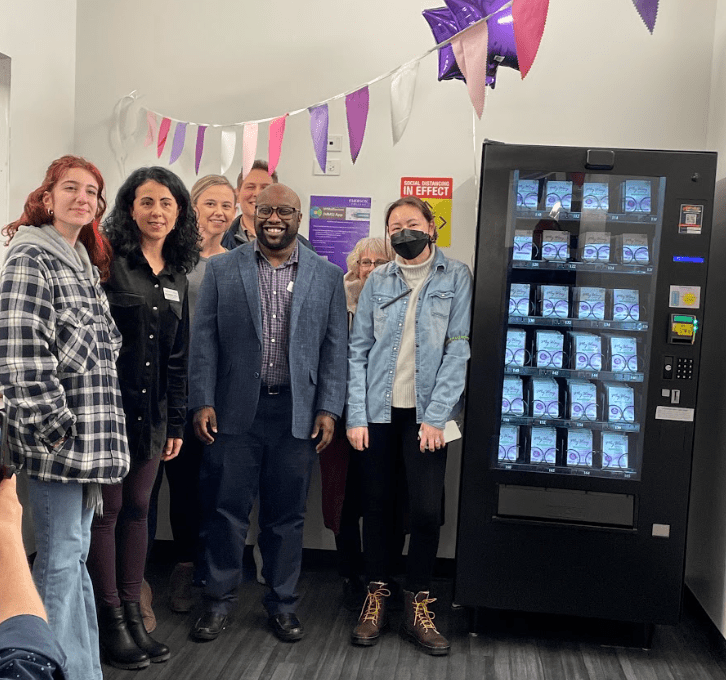Wellness Center Offers Students Low-Cost Emergency Contraception Vending Machine

The Emerson Wellness Center unveiled its new emergency contraception vending machine located in the Little Building on January 31.
“In a time where reproductive rights have been challenged, the Emerson Wellness Center would like to provide emergency contraception for our Emerson community that is affordable and accessible,” said Lisa Viveiros, associate director of health services, at the ribbon-cutting ceremony.
According to the Centers for Disease Control and Prevention, nearly one in four women (or 23 percent) aged 20-24 have used emergency contraception in their lives. The use of emergency contraception pills has increased during the past 20 years. Between 2017-2019, 28 percent of women, ages 15-44, who have had sex with a male reported using emergency contraception pills at least once in their lives, according to a study done by the National Survey of Family Growth.
The morning-after pill is most effective when taken 72 hours after unprotected sex, but the sooner the pill is taken, the better it will work. Since the pill is best taken as soon as possible after unprotected sex, access was one of the most important aspects of the project. The vending machine is centrally located in the mailroom of the Little Building, home to all first-year students, and is available 24/7.
Both affordability and access can be issues for students seeking the morning-after pill. The brand name Plan B runs at about $40 to $50 a pack at a drugstore such as CVS or Walgreens. The average price of a Plan B equivalent can run anywhere from about $10 to $50, depending on how you’re accessing it. Each pack in Emerson’s vending machine is $10 with cash or $10.10 with a credit card.
After Viveiros heard about Boston University’s emergency contraception vending machine opening in March 2022, she networked at a conference to learn how other universities in the area set up this resource and the impact it has had on those institution’s student community.
In light of Roe v. Wade being overturned in June 2022, Viveiros said that among reproductive health professionals, the topic of how to increase access to reproductive health resources for students and the general public became even more vital.
“As an individual who strongly feels that the need for access to services is so important, I decided that this would be a great addition to all of the services we currently provide to students,” Viveiros said.
Viverios said Wellness Center staff saw a need for better access to emergency contraception due the type of appointments students were requesting (prescriptions for Plan B or emergency contraception equivalents, pregnancy tests, etc.)..
At the same time, Viveiros said students have come to Wellness Center staff interested in what else Emerson was doing to support students in the context of the changes of Roe v. Wade and access to abortion rights.
In addition to the vending machine, the Wellness Center recently unveiled a more robust reproductive and gynecological health webpage. The new webpage acts as a central location to house all reproductive and gynecological services the Wellness Center offers, as well as a list of other community resources.
Apart from the difficulties some students may have affording emergency contraceptives, it can also be embarrassing — requiring either an office visit for a prescription or a trip to a pharmacy — or challenging, if an individual does not understand how to navigate the situation. The new and improved webpage hopes to be a one-stop shop resource for all information regarding reproductive and gynecological services.
“We hope to reduce the stigma around sexual health and reproductive rights and promote a culture of normalcy around this topic,” Vivieros said.
In the coming month, the Wellness Center plans to add additional sexual health products to the vending machine, including internal and external condoms, dental dams, and lubricant, as well as menstrual products such as tampons and pads. These items are also available for free to students in the waiting room of Health Services.
Health Services can also provide students with birth control options, including oral birth control pills, the patch, and the NuvaRing. While Health Services does not insert IUDs or the Nexplanon implant, the webpage features links to close-by services for interested students.

“We’ve already had a lot of really amazing feedback, even just since the ribbon cutting, from students, staff, faculty, and even parents thanking us for caring about their students and offering this,” said Brandin Dear, associate dean for campus life and director of counseling, health, and wellness.
The vending machine is a new initiative as part of the launch of the Emerson Wellness Center. For the past two years, the Center for Health and Wellness and Emerson Counseling and Psychological Services have been working on merging in order to launch a new integrated health center. The department hopes to focus on supporting the well-being of students from a holistic approach, with its mission to provide inclusive, accessible, and comprehensive services to Emerson students.
With the launch come new initiatives such as EmWell, a mental health support option for students, including a 24/7 support line, free counseling sessions (telehealth and in-person), and a wellness hub including free membership to Headspace, Silvercloud CBT modules, mental health articles, videos, and more.
“We want our students to know that we support them and their sexual health. We want to keep them informed about resources and give them the appropriate information to make good choices about their bodies,” Dear said.
When beginning the vending machine project, Viveiros and other staff at the Wellness Center looked to their student workers for feedback. Stephanie Trendell ‘25 and Charly Pena ‘25, student office assistants in the Wellness Center, were both advocates of the project and are excited to see the impact of the vending machine on campus.
“Emerson students come from all over the country and the world. Especially with students who come from areas where abortion access is restricted, Emerson can provide space for students to feel they have control of their reproductive rights when they step onto campus,” Trendell said. “I think the new vending machine will make students feel like our reproductive rights are protected as long as we are here at Emerson, which is a really important message.”
“I think this vending machine actively takes a stance on reproductive rights,” Pena said. “In this time where reproductive rights are seemingly out of our hands, it’s important to do what we can to support those with uteruses and provide them with autonomy over their bodies. I think this vending machine is a small step towards that.”
Categories